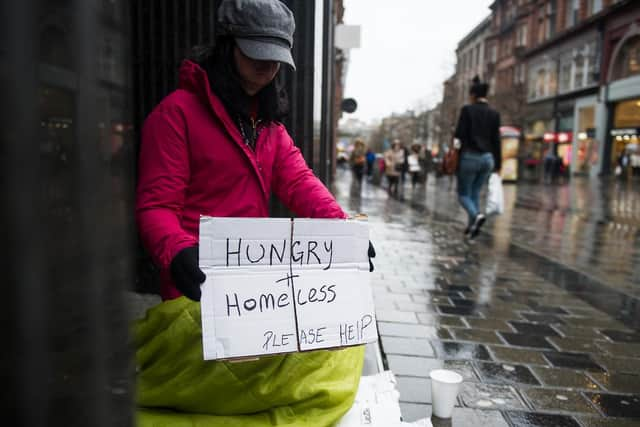Contactless payment points to help homeless and reduce begging in Glasgow
Street Change Glasgow, a project backed by the city council as well as several third sector organisations, offers the public an alternative to giving change to one of the many beggars who frequent the streets around Central station.
Three contactless payment points have been installed, with the hope more can be added in the premises of city centre businesses as more sign up to the scheme.
Advertisement
Hide AdAdvertisement
Hide AdCash raised by the project will be used to pay for items such as travel to or clothing for job interviews, to provide tools or protective clothing required to take up a job offer or continue employment or to help people access training.


A begging strategy group set up the council visited other cities in the UK, including Manchester and Liverpool, to observe what schemes have been used there and to evaluate what would be most suitable for Glasgow.
Lorraine McGrath, chief executive of Simon Community Scotland, said: “We are constantly working to find new ways to reach, respond and resolve the kind of desperation that drives someone to street beg.
"Street Change Glasgow provides one such new way for us to reach and bring new options for people to assist them to move away from the harms that result from street begging.
"We are delighted and privileged to host the initiative and bring all of our expertise in responding to the most extreme vulnerabilities of those caught up in all forms of street lifestyles. We know from direct experience what difference having access targeted funds can make in bring change for even the most chronic and concerning circumstances, working person by person to find what works for them.”
Dr Beth Watts, a senior research fellow at Heriot-Watt University specialising in homelessness, told The Scotsman: “We might expect diverted giving schemes like this to have a number of effects.
“They might encourage more people and more businesses to donate money, and generating more resources to respond to issues like homelessness and begging is a good thing if that money is spent on evidence-informed interventions.
“Schemes like this also aim to divert cash that might have been given directly to people begging to supportive organisations instead.
Advertisement
Hide AdAdvertisement
Hide Ad“That means, in theory, support organisations can work with people to spend that money on things that will most benefit them, and ensure that donations are not spend on things like drugs or alcohol.”
The academic continued: “This is a really emotive debate – some people argue that we should always give, give unconditionally and not judge people for how they spend that money.
“While I completely agree that we should not direct any judgement or stigma at those begging on the street, we do also have to take seriously that this is a group with often complex needs vulnerable to very serious harms.
“We have to think carefully about the best ways to genuinely address the needs of this group.
“Available evidence would suggest that assertive outreach seeking to understand people’s needs, and help them to achieve them with personalised support is what’s needed.
“If this scheme helps take us in that direction, that could be a real positive. It could also help generated more much needed evidence on who is involved in begging, why and what the best response to that is.”
The project will work alongside existing services which help vulnerable people in the city centre such as Glasgow’s homelessness services, and the Glasgow Alliance to End Homelessness.
Comments
Want to join the conversation? Please or to comment on this article.
